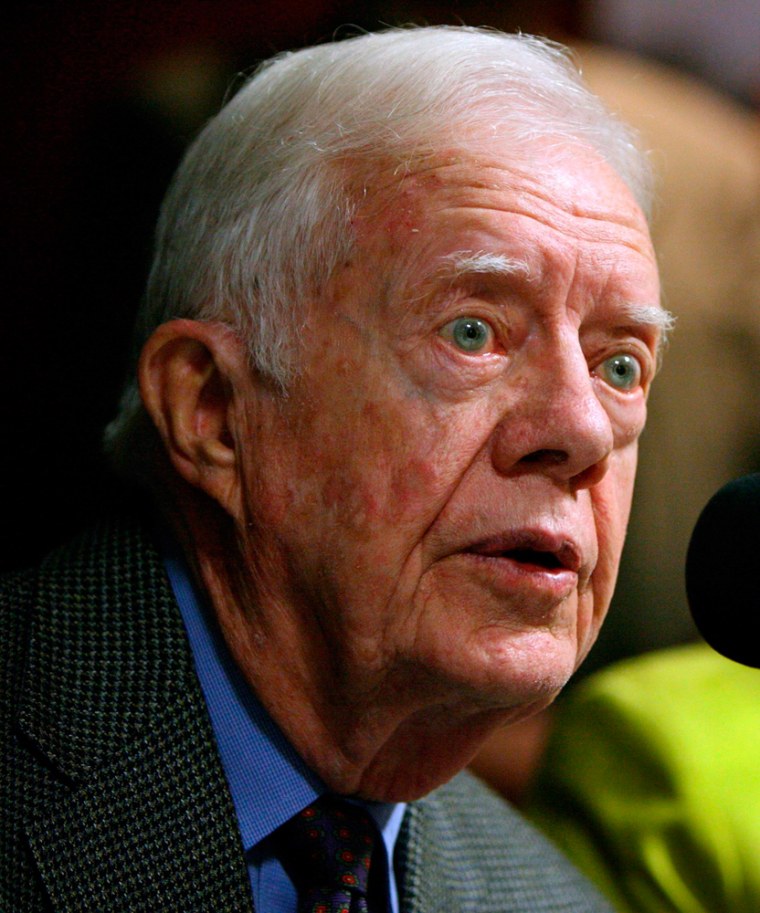Former U.S. President Jimmy Carter said Monday the crisis in Zimbabwe appears "much worse than anything we ever imagined" after the government there blocked his weekend humanitarian visit.
Carter, former U.N. Secretary-General Kofi Annan and child advocate Graca Machel called for southern African leaders to halt the "deep suffering" in Zimbabwe, where the U.N. says more than 5 million people face imminent starvation.
The president of neighboring South Africa, meanwhile, warned Zimbabwe "may implode and collapse," as he announced a new round of talks to try to resolve the political impasse.
His comments, some of the strongest yet by South Africa, come as a cholera epidemic has killed hundreds of Zimbabweans and spilled across the border into South Africa. Officials say Zimbabwe's political and economic collapse caused the outbreak.
South African President Kgalema Motlanthe and the leader of the country's ruling party, Jacob Zuma, expressed grave concern at Zimbabwe's deepening humanitarian crisis after meeting with Carter, Annan and Machel.
The three are part of a group called The Elders that was formed by former South African President Nelson Mandela to help foster peace.
"Unless this root cause of the political absence of a legitimate government is solved, the situation will get worse and may implode and collapse," Motlanthe said.
Power-sharing in limbo
Machel said other southern African nations should follow the example of South Africa, which last week announced it was withholding 30 million rand (US$3.3 million) in agricultural aid to Zimbabwe until the government and opposition form a unity government.
Zimbabwe has been in political deadlock since opposition leader Morgan Tsvangirai won the most votes in the March presidential election but not enough to avoid a runoff. President Robert Mugabe, who has been in power since independence in 1980, claimed victory in the June runoff after Tsvangirai dropped out over violence aimed at his supporters.
The two agreed in September to share power but the talks have stalled over the allocation of Cabinet posts, with the opposition accusing Mugabe of trying to hold onto key positions.
Mediation led by former President Thabo Mbeki will resume Tuesday in South Africa and center on a constitutional amendment to allow a power-sharing government, Motlanthe said.
Zuma, the African National Congress leader who is likely to be South Africa's next president, said that his party would send a team to meet with politicians in Zimbabwe "soon."
The Elders had planned to visit Zimbabwe over the weekend on a humanitarian mission but Mugabe's government refused them visas, saying the trip had not been coordinated with the government beforehand.
Instead, they met with charity, donor and civil leaders from Zimbabwe in neighboring South Africa.
Humanitarian crisis
Carter said the stories they heard about the collapse of education, health and agriculture "are all indications that the crisis in Zimbabwe is much worse than anything we ever imagined."
He said "the leadership in Harare don't want to admit there is a crisis."
Adding to the implied criticism of regional leaders, Carter said "I get the feeling that even the leaders of SADC (the Southern African Development Community) do not know what is going on" in Zimbabwe.
He called for the southern Africans as well as the African Union and the United Nations to send assessment teams to Zimbabwe.
Annan said they also met with Zimbabwe opposition leaders and stressed to them that "the most important thing is the people's lives." He said they would have given the same message to Mugabe, if they had had a chance.
Both the Elders and the South African leaders on Monday agreed that it is difficult to separate Zimbabwe's humanitarian crisis from the political issues.
"These are two sides of the same coin and we need to deal with them simultaneously with the urgency they deserve," Motlanthe said.
